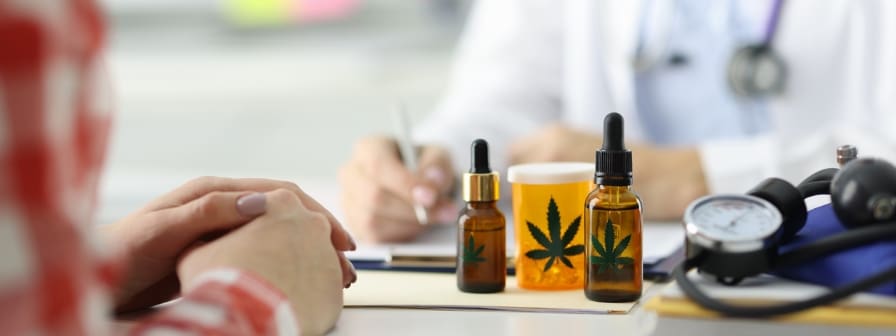Health benefits and side effects of medical marijuana
5 min read



Medical cannabis, also known as medical marijuana, refers to cannabis used to help treat or relieve symptoms of certain health conditions.
Research supports cannabis as an effective way to help manage several conditions and symptoms, including chronic pain, nausea, and epilepsy.
Most research focuses on the health benefits of individual compounds in cannabis, including cannabinoids like tetrahydrocannabinol (THC) and cannabidiol (CBD).
Keep reading to learn about the main benefits and side effects of medical marijuana.
Get your medical marijuana card
Connect with a licensed physician online in minutes.
Larger purchase limits Access to higher potency strains Save up to 40% on product taxes Enhanced legal protection
Medical marijuana benefits
Many of the health benefits of cannabis come from its cannabinoids, including THC and CBD.
These compounds interact with your body’s endocannabinoid system, which helps regulate functions like mood, inflammation, and pain tolerance.
Treats chronic pain
According to a review of research, certain cannabis compounds, including THC and CBD, may help lower sensitivity to pain.
Other human studies report similar findings. A phase 3 clinical trial reported that cannabis helped reduce lower back pain. And in a research review, cannabis eased neuropathic pain.
Reduces muscle spasms
Some research suggests that cannabis may help with muscle spasms and other symptoms in people who have multiple sclerosis (MS).
Sativex is an oromucosal spray that contains equal parts THC and CBD. Clinical trials have shown that it’s effective at managing muscle spasms in MS.
In Canada, the United Kingdom, and many other countries, Sativex can be prescribed for MS-related spasms and other symptoms, but it hasn’t been approved for use in the U.S. yet.
Reduces tremors
In one small study of people with Parkinson’s disease, cannabis helped reduce tremors, though larger human studies are needed to confirm this benefit.
Improves nausea and appetite loss
Compounds in cannabis, including THC, can help reduce nausea and increase appetite for some individuals.
In fact, two medications containing lab-made THC — dronabinol and nabilone — are approved by the Food and Drug Administration (FDA) to treat nausea, vomiting, and appetite loss associated with cancer treatment or HIV.
More research is needed to determine if other types of medical cannabis products or specific cannabinoids can help with nausea or appetite loss generally.
The research that does exist shows positive results, but studies are small.
A review of research in humans and animals suggests that cannabis compounds may help ease chemotherapy-induced nausea, and other small studies report that cannabis can help with appetite loss caused by specific health conditions, including irritable bowel disease (IBD) and HIV.
Helps with insomnia
Larger-scale clinical trials are needed to determine if cannabis can treat insomnia, but the evidence that exists generally supports its use for disordered sleep.
In a retrospective case series, researchers found that 48 of 72 patients experienced improved sleep after using CBD.
Findings from a self-reported study of 802 frequent cannabis users suggest that cannabis may reduce the time it takes to fall asleep.
It’s important to note, however, that THC might disrupt rapid eye movement (REM) sleep, which is important for memory and emotional regulation.
Treats seizure disorders
A review of human and animal studies suggests that CBD may help reduce seizures associated with epilepsy.
Epidiolex is an FDA-approved, CBD-based medication that can treat refractory epilepsy, a form of epilepsy that’s resistant to common medications.
Side effects of medical marijuana
Cannabis may cause some side effects, especially when taken in high doses. These include:
- Dizziness
- Drowsiness
- Dry mouth
- Dry eyes
- Confusion
- Headache
- Upset stomach
- Anxiety and paranoia, especially after consuming high doses of THC
Not all cannabis products are intoxicating. CBD is a nonintoxicating compound in cannabis that may offer certain health benefits without producing a “high.”
Cannabis can also interact with commonly used medications. This may increase the risk of certain side effects. If you’re taking any medications, talk with your doctor before combining them with cannabis.
To minimize your risk of side effects, consider starting at a low dose of cannabis and increasing gradually as needed to achieve the required therapeutic benefit.
Speak with your doctor or a Leafwell pharmacist to create a dosage plan that minimizes any risks.
Get your medical marijuana card
Connect with a licensed physician online in minutes.
Larger purchase limits Access to higher potency strains Save up to 40% on product taxes Enhanced legal protection
How to use medical marijuana
Cannabis comes in various forms, including edibles, tinctures, pills, and topicals.
Consider your personal needs and preferences to choose the product form that best suits you.
To use medical cannabis, it’s best to work with your healthcare team and create a treatment plan that covers dosing, timing, and product types.
They may recommend that you use the following product types:
- Inhaled products (smoking or vaporizing):Inhaled products, including cannabis flower, vaporizers, and concentrates (aka dabs), can provide rapid and powerful relief. Inhaled products may be helpful for acute health symptoms, such as an anxiety attack or migraine episode, but they can also irritate the throat and lungs.
- Edibles: Cannabis edibles include lozenges, gummies, and other products you eat or drink. They produce longer-lasting effects than other product forms, so they may be ideal if you’re seeking extended or overnight symptom relief. Capsules are another option for precise dosing.
- Tinctures:Cannabis tinctures contain cannabis extract in a carrier liquid, like oil or alcohol. They come in dropper bottles for controlled dosing. You may be recommended a cannabis tincture for relatively quick yet long-lasting relief.
- Topicals:Cannabis topicals include creams, gels, and balms. With the exception of transdermal patches, topicals don’t produce intoxicating effects because they aren’t absorbed beyond the skin. Topicals can be helpful for localized pain or inflammation, such as joint pain or sore muscles.
- Sprays or strips: Similar to tinctures, oral sprays and strips can take effect quickly. Nasal sprays are also available.
- Suppositories: Suppositories may be particularly helpful for easing menstrual cramps and symptoms of IBD.
Is medical marijuana legal?
Medical cannabis is not federally legal, but it is legal in many parts of the U.S.
If you live in a state or territory where only medical use is legal, you must be registered with your state’s medical cannabis program to purchase and consume cannabis legally.
Hemp refers to varieties of cannabis that contain very little THC. Hemp is federally legal and used across different industries. This means that hemp-derived products, like CBD oil or gummies, can be legally purchased and consumed in all 50 states.
Know the differenceHemp is a type of cannabis that is federally legal, with low levels of THC (0.3% or less by dry weight). Marijuana is often colloquially used to refer to cannabis varieties that produce a “high” and contain more than 0.3% THC. |
How to get started with medical marijuana
If you’re considering medical cannabis to help manage a health condition, consider the following:
- Research the effects of cannabis on your health condition: Learn about using cannabis for your health condition by reading studies and patient stories.
- Check your eligibility: To legally use medical cannabis, you must be at least 18 years of age or live in a state that allows an approved caregiver to obtain cannabis on your behalf. You also need to be diagnosed with one of your state’s qualifying conditions.
- Speak with a doctor: A cannabis-knowledgeable healthcare provider can give you an official recommendation for medical cannabis use, which is a key step to getting your medical card. They can also guide you on using cannabis to address your health-related needs.
- Find a dispensary: Having a medical cannabis card allows you to purchase safe and regulated cannabis from licensed dispensaries. Avoid buying cannabis products outside dispensaries, as they aren’t subject to strict testing or regulations.
- Start low and go slow: If you’re new to using cannabis, start with a low dose and only increase it as needed and tolerated under your doctor’s supervision. This can help lower the risk of side effects and maximize the therapeutic benefits.
Get your medical marijuana card
Connect with a licensed physician online in minutes.
Larger purchase limits Access to higher potency strains Save up to 40% on product taxes Enhanced legal protection
Frequently asked questions
Learn more about medical marijuana with answers to common questions.
What is the most common reason patients use medical cannabis?
Does medical cannabis have any positive effects?
How risky is cannabis?
Resources
- A pilot study of the effects of cannabis on appetite hormones in HIV-infected adult men. https://www.sciencedirect.com/science/article/abs/pii/S0006899311020282
- Cannabidiol in anxiety and sleep: A large case series. https://www.thepermanentejournal.org/doi/10.7812/TPP/18-041
- Cannabinoid regulation of acute and anticipatory nausea. https://www.liebertpub.com/doi/full/10.1089/can.2016.0006
- Cannabis and sleep architecture: A systematic review and meta-analysis. https://www.sciencedirect.com/science/article/pii/S1087079225001170
- Cannabinoids in chronic pain management: A review of history, efficacy, applications, and risks. https://www.mdpi.com/2227-9059/13/3/530
- Cannabis-based medicines for chronic neuropathic pain in adults. https://www.cochranelibrary.com/cdsr/doi/10.1002/14651858.CD012182.pub2/full
- Cannabis in the treatment of epilepsy: Hard evidence at last? https://pmc.ncbi.nlm.nih.gov/articles/PMC5767492/
- Cannabis (medical marijuana) treatment for motor and non-motor symptoms of Parkinson’s disease: an open-label observational study. https://pubmed.ncbi.nlm.nih.gov/24614667/
- Evidence for the efficacy and effectiveness of THC-CBD oromucosal spray in symptom management of patients with spasticity due to multiple sclerosis. https://journals.sagepub.com/doi/10.1177/1756285615612659
- Full-spectrum extract from Cannabis sativa DKJ127 for chronic low back pain: A phase 3 randomized placebo-controlled trial. https://www.nature.com/articles/s41591-025-03977-0
- H.R. 5485 – Hemp Farming Act of 2018. https://www.congress.gov/bill/115th-congress/house-bill/5485
- Is time elapsed between cannabis use and sleep start time associated with sleep continuity? An experience sampling method. https://www.sciencedirect.com/science/article/abs/pii/S0376871620300119
- Medical cannabis increases appetite but not body weight in patients with inflammatory bowel diseases. https://www.mdpi.com/2072-6643/16/1/78
- Real-world, long-term evaluation of the tolerability and therapy retention of Epidiolex® (cannabidiol) in patients with refractory epilepsy. https://pubmed.ncbi.nlm.nih.gov/36893722/
- The analgesic potential of cannabinoids. https://pmc.ncbi.nlm.nih.gov/articles/PMC3728280/


